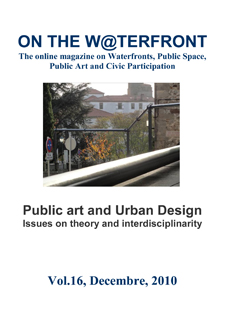Interdisciplinarity - Urban Design practice, a research and teaching matrix
Keywords:
Interdisciplinarity, Urban DesignAbstract
Because Urban Design is a territory of integrative synthesis, the “overall view” that it requires comes through the collaboration of various sources of knowledge, some through professional and others through non professional knowledge of users. The representation of actors involved in design (be them other professionals, urban deciders or users) is a part of research and teaching culture. The motivation of this line of work in design studio teaching is to understand uncertainty as an element of urban transformation, the contribution of collaborative and reflexive processes and also to stimulate the understanding of actors roles in urban design practices. "(...) Interdisciplinarity is a way to solve problems and answer questions that can not be addressed and answered by using a single method or approach (Klein)." It can be said that the integration process of urban design geared by interaction with users in problem solving, represents a major attempt to establish a common ground, making use of inputs from different disciplinary backgrounds. Interdisciplinary oriented Urban Design practice is not in itself a producer of knowledge. But it requires reflexivity and therefore can use research methodologies. Some questions remain: - How do we represent interdisciplinary work and what partners do we admit? - How do we represent the contexts and roles involved in project decisions? - How do we define the method and its pedagogy, its training and its evaluation? - How is the diversity of knowledge interaction to operate in urban strategies? - How are urban actors represented in the praxis of urban design teaching?Downloads
Published
2010-06-01
How to Cite
Brandão, Pedro, and Antoni Remesar. 2010. “Interdisciplinarity - Urban Design Practice, a Research and Teaching Matrix ”. on the w@terfront. Public Art.Urban Design.Civic Participation.Urban Regeneration, no. 16 (June):3-33. https://revistes.ub.edu/index.php/waterfront/article/view/18710.
Issue
Section
Articles
License
The
 licence allows: Share — copy and redistribute the material in any medium or format and Adapt — remix, transform, and build upon the material for any purpose, even commercially.The licensor cannot revoke these freedoms as long as you follow the license terms. Author's rights are protected by the ISSN 1139-7365. On the w@terfront has no restrictions respect the copyright by the authors and does allow authors to retain the publishing rights without restrictions.
licence allows: Share — copy and redistribute the material in any medium or format and Adapt — remix, transform, and build upon the material for any purpose, even commercially.The licensor cannot revoke these freedoms as long as you follow the license terms. Author's rights are protected by the ISSN 1139-7365. On the w@terfront has no restrictions respect the copyright by the authors and does allow authors to retain the publishing rights without restrictions.This journal does not apply any type of charge to the authors for the presentation or processing of the articles.







